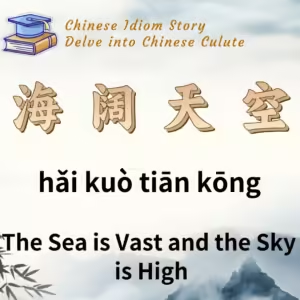
Chinese Idiom: 海阔天空 (Hai Kuo Tian Kong)
English Translation: The Sea is Vast and the Sky is High
pīn yīn: hǎi kuò tiān kōng
Idiom Meaning: This idiom symbolizes an open mind and unrestrained behavior. It is often used to describe aimless chatter or discussions that lack focus and direction.
Historical Source: From the Song Dynasty’s Poetry Talk General Principles citing Ancient Poetry Talk.
Idiom Story:
The famous Tang Dynasty painter Zhang Zao, known for his exceptional skills in landscape painting, particularly excelled in depicting pine trees. His artistry was characterized by a unique technique where he could hold two brushes simultaneously—one to paint vibrant green branches and the other to portray withered trunks. Historical records state that his work showcased the elegance and power of nature, illustrating pine trees that appeared to defy the elements, with branches that looked almost alive and textured bark reminiscent of fish scales.
Zhang Zao’s paintings were highly regarded, often referred to as “divine masterpieces,” due to their exquisite detail and dynamic representation of nature. However, one day while painting a pine tree on the wall of the Zhizhan Temple in Jingzhou, he faced an unexpected backlash. A monk named Xuanlan, known for his aloof demeanor, criticized Zhang’s painting as a defilement of the temple’s wall and proceeded to cover it with white powder.
Intrigued by Xuanlan’s actions, those around him inquired about his unusual standards of art. In response, he inscribed a poem on bamboo that read:
“大海从鱼跃,长空任鸟飞。”
(The sea is vast, allowing fish to leap; the sky is high, permitting birds to soar.)
The essence of this poem conveyed the monk’s philosophy: his heart was as expansive as the deep sea, embracing the freedom of jumping fish, and his mind was as boundless as the sky, allowing birds to fly without constraint.
Over time, the phrase “大海从鱼跃,长空任鸟飞” was simplified and transformed into the idiom “海阔天空,” symbolizing openness, freedom, and the vastness of both nature and the human spirit.






